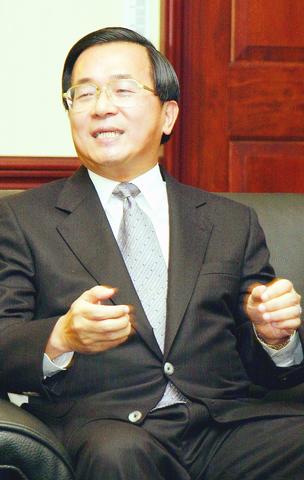Legislative reform will be the single most important issue after Saturday's polls and a referendum could be used to ensure it gets top priority, President Chen Shui-bian (
Chen said yesterday that more than 80 percent of the public supports measures such as halving the number of legislative seats and creating single-member electoral districts.
Other ideas include lengthening the terms of lawmakers from three years to four and having legislative and presidential elections fall in the same year.

PHOTO: COURTESY OF THE PRESIDENTIAL OFFICE
And if the KMT and New Party don't back the proposed reforms, Chen said, he would take the issue directly to the public through a referendum.
"If reform becomes a nationwide movement, then no individual or political party can say `no' to this trend," Chen said. "If there is any political party opposing [the reforms], we'll have no choice but" to resort to a referendum.
Currently, Taiwan lacks a public referendum law that would allow voters to decide public policy issues directly.
Though the KMT and New Party have yet to announce their stance on proposed legislative reforms, the two parties should heed public opinion, Chen said.
"The threshold for a constitutional amendment is very high, requiring the consent of three-fourths of the lawmakers present," the president said.
"If these two political parties reject reforms, then a referendum law -- the passage of which would only require half of the lawmakers present -- would have to go ahead first."
Asked about his proposed "cross-party alliance for national stabilization," Chen said the group would be a "decision-making mechanism" of 120 members that would include members from each political party. "But these 120 people will elect representatives, who will be engaged in collective decision-making."
"As for myself, I will not play any role, but focus on performing my presidential duties," Chen said. "But this alliance can make proposals on a variety of issues, for example, nominations for premier and the Cabinet or even the new speaker of the Legislative Yuan."
Asked for his opinion on former president Lee Teng-hui's (李登輝) proposed "Taiwan Advocates" (群策會) group, Chen said he would back any organization that assists the nation's development and brings stability to its politics. Chen also plans to attend the group's founding ceremony on Monday.

PREPAREDNESS: Given the difficulty of importing ammunition during wartime, the Ministry of National Defense said it would prioritize ‘coproduction’ partnerships A newly formed unit of the Marine Corps tasked with land-based security operations has recently replaced its aging, domestically produced rifles with more advanced, US-made M4A1 rifles, a source said yesterday. The unnamed source familiar with the matter said the First Security Battalion of the Marine Corps’ Air Defense and Base Guard Group has replaced its older T65K2 rifles, which have been in service since the late 1980s, with the newly received M4A1s. The source did not say exactly when the upgrade took place or how many M4A1s were issued to the battalion. The confirmation came after Chinese-language media reported

The Taiwanese passport ranked 33rd in a global listing of passports by convenience this month, rising three places from last month’s ranking, but matching its position in January last year. The Henley Passport Index, an international ranking of passports by the number of designations its holder can travel to without a visa, showed that the Taiwan passport enables holders to travel to 139 countries and territories without a visa. Singapore’s passport was ranked the most powerful with visa-free access to 192 destinations out of 227, according to the index published on Tuesday by UK-based migration investment consultancy firm Henley and Partners. Japan’s and

A Ministry of Foreign Affairs official yesterday said that a delegation that visited China for an APEC meeting did not receive any kind of treatment that downgraded Taiwan’s sovereignty. Department of International Organizations Director-General Jonathan Sun (孫儉元) said that he and a group of ministry officials visited Shenzhen, China, to attend the APEC Informal Senior Officials’ Meeting last month. The trip went “smoothly and safely” for all Taiwanese delegates, as the Chinese side arranged the trip in accordance with long-standing practices, Sun said at the ministry’s weekly briefing. The Taiwanese group did not encounter any political suppression, he said. Sun made the remarks when

BROAD AGREEMENT: The two are nearing a trade deal to reduce Taiwan’s tariff to 15% and a commitment for TSMC to build five more fabs, a ‘New York Times’ report said Taiwan and the US have reached a broad consensus on a trade deal, the Executive Yuan’s Office of Trade Negotiations said yesterday, after a report said that Washington is set to reduce Taiwan’s tariff rate to 15 percent. The New York Times on Monday reported that the two nations are nearing a trade deal to reduce Taiwan’s tariff rate to 15 percent and commit Taiwan Semiconductor Manufacturing Co (TSMC, 台積電) to building at least five more facilities in the US. “The agreement, which has been under negotiation for months, is being legally scrubbed and could be announced this month,” the paper said,